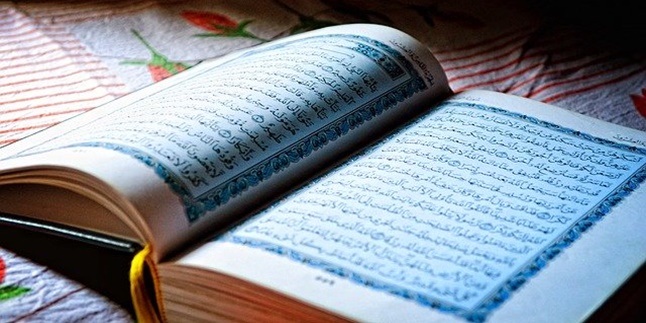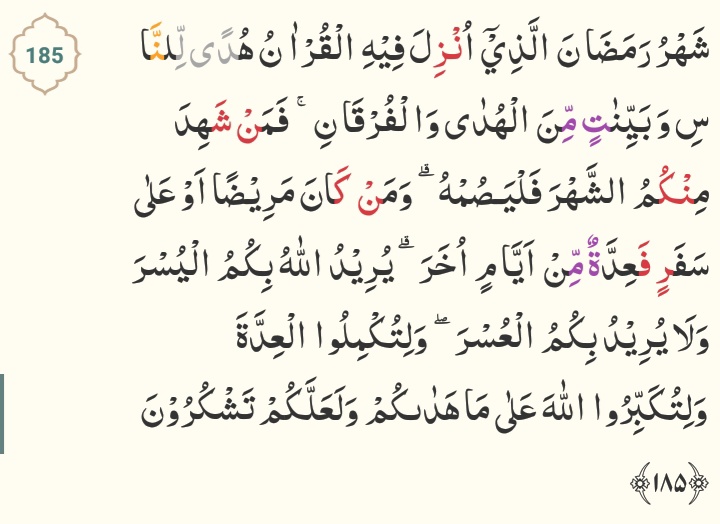5 Healthy, Nutritious, and Convenient Iftar Menu Recipes
Keeping your body in good condition during fasting is necessary. One thing you can do is consume healthy food during suhoor and iftar.

Kapanlagi.com - Ramadan fasting is one of the obligatory worship for Muslims who have reached puberty. The commandment about fasting in Ramadan came directly from Allah SWT. At least, there are 4 verses in Surah Al Baqarah that contain the command to fast.
In Islam, besides Ramadan fasting, there are also various sunnah fasting, such as fasting on Mondays and Thursdays, fasting of Prophet David, fasting of Arafah, fasting of Shawwal, and so on. However, Ramadan fasting is special because this fasting worship can only be done specifically during the month of Ramadan.
-----------------------
Ramadan News: Want to Break the Fast with Celebrities?
Join KapanLagi Buka Bareng, an online iftar event with Jirayut and Rara LIDA on May 9th. There will also be Chef Norman, Danilla, and Adhitia Sofyan. How to participate? Register first here, and fill in your personal information. Everything is FREE.Read the complete guide here.
Register now.If not now, when?
-----------------------
Here are some verses in Surah Al Baqarah that discuss the commandment of fasting and the specialness of Ramadan fasting.

Illustration (credit: Alquran Indonesia App)
Surah Al-Baqarah verse 183 is perhaps the most frequently quoted verse to explain the commandment of fasting. Here is the wording of the verse:
O you who have believed, fasting has been prescribed upon you as it was prescribed upon those before you that you may become righteous
Based on the translation of the verse, it can be understood that the act of fasting actually existed before the time of Prophet Muhammad (pbuh). Furthermore, the meaning of the verse also explains that the obligation to observe fasting applies to those who are among the believers.

Illustration (credit: Alquran Indonesia App)
Continuation from Surat Al Baqarah verse 183, verse 184 also discusses fasting. Here is an excerpt of the meaning of verse 184, Surat Al Baqarah:
(That is) on certain days. So whoever among you is ill or on a journey (then they should fast) an equal number of days [later]. And upon those who are able [to fast, but with hardship] - a ransom [as substitute] of feeding a poor person [each day]. And whoever volunteers excess - it is better for him. But to fast is best for you, if you only knew.
This excerpt of the meaning in Surat Al Baqarah 184 explains various conditions related to the Ramadan fasting. Among them, the allowance of not fasting but making up for it by fasting outside the month of Ramadan is mentioned. Additionally, it is explained that those who are genuinely unable to fast can substitute it by paying fidyah.

Illustration (credit: Alquran Indonesia App)
Not only in verses 183 and 184, but also in verse 185, there is an explanation about fasting. It means as follows:
(The prescribed period is) the month of Ramadhan in which the Qur'an was revealed as a guidance for mankind with clear proofs of guidance and criterion. So whoever sights [the new moon of] the month, let him fast it; and whoever is ill or on a journey - then an equal number of other days. Allah intends for you ease and does not intend for you hardship and [wants] for you to complete the period and to glorify Allah for that [to] which He has guided you, and perhaps you will be grateful.
In Surah Al-Baqarah verse 185, Allah explains that one of the privileges of the month of Ramadhan is the revelation of the holy book, the Qur'an. Fasting becomes an act of worship that adds to the uniqueness of the month of Ramadhan. In this verse, it is also explained that it is allowed for Muslims who are traveling or sick to not fast during Ramadhan. However, they are still required to make up for the missed fasts on other days.

Illustration (credit: Alquran Indonesia App)
Another verse in Surah Al Baqarah that discusses fasting is verse 187.The verse means:
It has been made lawful for you to approach your wives during the nights of the fast.They are a garment for you and you are a garment for them.Allah knew that you were being dishonest to yourselves, so He has turned to you and pardoned you.So now, you may approach them and seek what Allah has ordained for you, and eat and drink until the white thread of dawn becomes distinct from the black thread.Then complete the fast until nightfall, but do not approach them while you are in retreat in the mosques.That is the limit set by Allah, so do not approach it.Thus does Allah make clear His verses to the people that they may become righteous.
Surah Al Baqarah verse 187 further explains that the time limit for fasting in Islam is from dawn until nightfall. In addition, this verse also explains various things that are prohibited during fasting and allowed again to be done after the time of breaking the fast or at night.
Well, those are the 4 verses in Surah Al Baqarah that discuss the command of fasting, especially Ramadan fasting. Hopefully, by studying the verses above, it can increase faith and piety in carrying out fasting.
(kpl/psp)
Cobain For You Page (FYP) Yang kamu suka ada di sini,
lihat isinya
Keeping your body in good condition during fasting is necessary. One thing you can do is consume healthy food during suhoor and iftar.
During fasting, it is enjoyable to drink something sweet and refreshing. But it is healthier to make it ourselves. Let's check out this sweet, refreshing, and healthy drink.
For Muslims, Friday feels very special compared to other days. On that day, many good events happen and are mentioned in the Quran and Hadith. The virtues of Friday are diverse and can be felt by every Muslim around the world.
Some people prefer simple dishes that are easy to make. One of them comes from tofu which can be created with various delicious and trendy recipes.
There is currently a lot of buzz on social media about the occurrence of Dukhan, but is it true that Dukhan will happen today on the 15th of Ramadan? Let's directly check the explanation.
Performing the fasting of Ramadan is something that we, as Muslims, must do. However, it's not just about performing it, there are things that can actually affect the value of our fasting in the eyes of Allah. What are those things? Let's check them out.
Aside from rice, it turns out there are foods that can be used as the main source of energy in the body. Of course, these foods have many benefits for body health. What are they? Let's check it out.
Breaking the fast with delicious food is certainly common. However, breaking the fast with a healthy and appetizing menu might be rarely considered. There is a delicious and healthy iftar menu, such as various processed pepes menus.
The charm of Dul Jaelani, the youngest son of Ahmad Dhani and Maia, always attracts attention. Besides having a handsome face, the calm nature possessed by this 19-year-old man is able to captivate the hearts of women thanks to his musical talent.
A girl who is also an artist and student from Iceland has attracted attention after she created various unique and strange masks in the shape of protruding tongues. Her creations even made it into Vogue Magazine, a world-renowned fashion magazine.
Recently, Didi Kempot's departure has become a trend and the community is shocked. If we look back, in 2020 there were several local artists who died suddenly. Here is a list of artists who died in 2020
Like a satire to the action of a prank YouTuber who filled a transgender with garbage groceries a few days ago. A young man who is also an entrepreneur known as Crazy Rich Surabaya, shared a box of instant noodles filled with millions of rupiah.